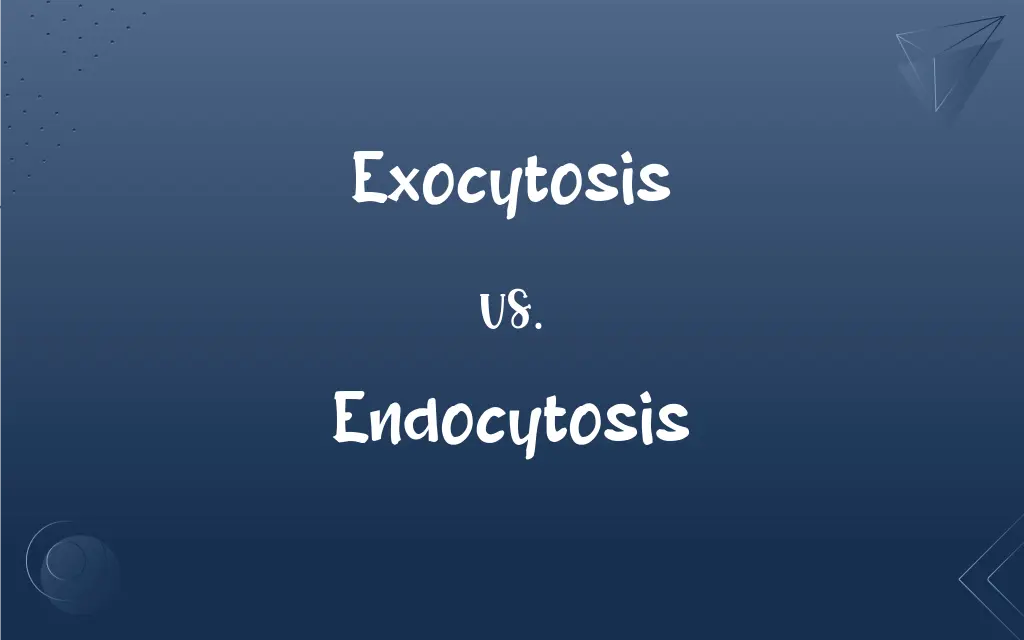Exocytosis vs. Endocytosis: What's the Difference?
Edited by Janet White || By Harlon Moss || Updated on October 28, 2023
Exocytosis is the process of cells expelling materials, while endocytosis is the process of cells taking in materials.

Key Differences
Exocytosis and endocytosis are two fundamental cellular processes for material transport. Exocytosis involves the cell expelling substances to the outside environment, whereas endocytosis is the process of the cell engulfing materials from the outside.
In exocytosis, materials like proteins and neurotransmitters are packaged into vesicles and released outside the cell. Endocytosis, in contrast, involves the cell membrane folding inward to form a vesicle that encapsulates external substances.
While exocytosis is primarily associated with the release of molecules, endocytosis is critical for nutrient uptake, signal reception, and immune responses. Exocytosis helps in communication between cells and removes waste, whereas endocytosis allows for the intake of essential molecules.
Exocytosis can occur continuously or in a regulated manner in response to specific signals. Endocytosis can be categorized into phagocytosis, pinocytosis, and receptor-mediated endocytosis, each with specific functions and mechanisms.
Both exocytosis and endocytosis are vital for maintaining cellular homeostasis and communication. However, exocytosis generally involves exporting materials out of the cell, while endocytosis is about importing materials into the cell.
ADVERTISEMENT
Comparison Chart
Primary Function
Expelling materials from the cell.
Taking in materials into the cell.
Process
Vesicles fuse with cell membrane.
Cell membrane forms vesicles.
Types
Continuous or regulated.
Phagocytosis, pinocytosis, receptor-mediated.
Role
Cellular communication, waste removal.
Nutrient uptake, immune response.
Direction
Outward transport.
Inward transport.
ADVERTISEMENT
Exocytosis and Endocytosis Definitions
Exocytosis
The process of cells expelling materials using vesicles.
Exocytosis plays a key role in releasing neurotransmitters.
Endocytosis
The inward transport of materials into a cell.
Endocytosis helps immune cells capture pathogens.
Exocytosis
Vesicular transport of molecules out of the cell.
Digestive enzymes are expelled via exocytosis.
Endocytosis
The cellular process of engulfing external substances.
Nutrients are often absorbed by cells via endocytosis.
Exocytosis
Cellular mechanism for secreting substances.
Hormones are often released through exocytosis.
Endocytosis
A process where cells ingest substances from the outside.
Endocytosis is essential for nutrient uptake in cells.
Exocytosis
The fusion of vesicles with the cell membrane to release contents.
In exocytosis, waste products are expelled from the cell.
Endocytosis
Cellular mechanism for internalizing molecules.
Receptor-mediated endocytosis is key in hormone signaling.
Exocytosis
A cellular process for exporting molecules.
Exocytosis is crucial for cell communication.
Endocytosis
Formation of vesicles to take in extracellular materials.
Cells use endocytosis to intake necessary proteins.
Exocytosis
A process of cellular secretion or excretion in which substances contained in vesicles are discharged from the cell by fusion of the vesicular membrane with the outer cell membrane.
Endocytosis
A process of cellular ingestion by which the plasma membrane folds inward to bring substances into the cell.
Exocytosis
(biology) The secretion of substances through cellular membranes, either to excrete waste products or as a regulatory function.
Endocytosis
(cytology) The process by which the plasma membrane of a cell folds inwards to ingest material.
FAQs
What is endocytosis?
Endocytosis is the process where cells take in materials.
What role does exocytosis play in the body?
It's crucial for cellular communication and waste removal.
What is exocytosis?
Exocytosis is the process where cells expel materials.
What is the significance of endocytosis?
It's important for nutrient uptake and immune responses.
What are the types of endocytosis?
They include phagocytosis, pinocytosis, and receptor-mediated endocytosis.
What substances are commonly ingested by endocytosis?
Nutrients, hormones, and pathogens, among others.
Can exocytosis be triggered by signals?
Yes, regulated exocytosis is often signal-triggered.
How do cells use exocytosis?
Cells use it to secrete hormones, enzymes, and neurotransmitters.
Can exocytosis occur continuously?
Yes, some cells continuously expel materials.
Is endocytosis a selective process?
It can be, especially in receptor-mediated endocytosis.
How does exocytosis affect neurotransmission?
It's key for releasing neurotransmitters into synapses.
Are there different types of exocytosis?
Yes, including continuous and regulated exocytosis.
Do all cells perform exocytosis?
Most cells have some form of exocytosis.
Are viruses taken in by endocytosis?
Many viruses enter cells through endocytosis.
What is the role of endocytosis in cell signaling?
It helps internalize receptors and signaling molecules.
What structures are involved in endocytosis?
The cell membrane and vesicles are key structures.
Does endocytosis require energy?
Yes, it's an energy-consuming process.
How do vesicles form in exocytosis?
They form from the Golgi apparatus or endosomes.
What distinguishes phagocytosis from pinocytosis?
Phagocytosis engulfs large particles, while pinocytosis involves liquids.
Is exocytosis energy-dependent?
Yes, it requires energy to occur.
About Author
Written by
Harlon MossHarlon is a seasoned quality moderator and accomplished content writer for Difference Wiki. An alumnus of the prestigious University of California, he earned his degree in Computer Science. Leveraging his academic background, Harlon brings a meticulous and informed perspective to his work, ensuring content accuracy and excellence.
Edited by
Janet WhiteJanet White has been an esteemed writer and blogger for Difference Wiki. Holding a Master's degree in Science and Medical Journalism from the prestigious Boston University, she has consistently demonstrated her expertise and passion for her field. When she's not immersed in her work, Janet relishes her time exercising, delving into a good book, and cherishing moments with friends and family.































































